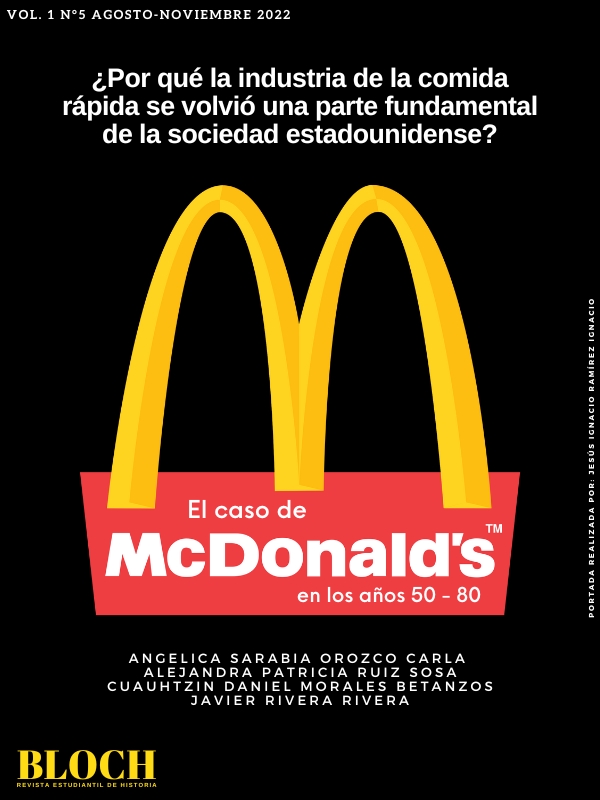Why Did The Fast Food Industry Become A Fundamental Part Of American Society?: The Case Of Mcdonald's In The 50s-80s

Published 2022-11-27
Keywords
- Burger; culture; religion; African Americans; consumption
How to Cite
Copyright (c) 2022 Carla Angelica Sarabia Orozco, Javier Rivera Rivera, Alejandra Patricia Ruiz Sosa, Cuauhtzin Daniel Morales Betanzos

This work is licensed under a Creative Commons Attribution 4.0 International License.
Abstract
Modern American society has fast food as one of many particular characteristics as part of its culture, of course this led to a sociocultural and historical process. Through this perspective we study the case of the McDonald's company and how it contributed to the cultural characteristic of fast food, and how it will be develop in the American community, through a type of dish that was little known at the time, but thanks to its versatility and flavor it would win the hearts of millions of Americans: the hamburger. For this analysis we use both primary and secondary sources, the latter predominate throughout our work. Finally, we consider that a contribution of our research is to shed light on this type of issues that are rarely treated from the perspective of a historical process, since in general the predominant perspective is from the field of health or structure business.
Downloads
References
- Chatelain, Marcia. Franchise:The Golden Arches in Black America. Nueva York: liveright publishing corporation, 2020.
- Depto. de estado de EE. UU., “Capítulo 12: Estado Unido en la posguerra”. En Reseña de la historia de los Estados Unidos, 2. Oficina de Programas de Información Internacional.
- De los ríos, Patricia, Los movimientos sociales de los años sesenta en Estados Unidos: un legado contradictorio. Sociológica, vol. 13, núm. 38, (1998): 3-30. https://www.redalyc.org/pdf/3050/305026670002.pdf.
- Gross, Daniel, “Ray Kroc, McDonald’s, and the Fast-Food Industry”. En Great test Business Stories of all time., 176-195. Nueva York: John Wiley & Sons, 1996.
- Hancock, John Lee, dir. El fundador, agosto 2016. https://www.youtube.com/watch?v=gKdSGHqgEgk
- Huergo, Juliana, “¿Me encanta? Crítica ideológica al sistema alimentario McDonald’s." Fundamentos en Humanidades XV, no. 29 (2014): 45-72. https://www.redalyc.org/articulo.oa?id=18447748003.
- "Our History". Corporate McDonald's. Consultado el 27 de agosto de 2021: https://corporate.mcdonalds.com/corpmcd/our-company/who-we-are/our-history.html.
- Roberts, Sophie. “McDonald’s opened its first restaurant on this day in 1940, here is the original menu”. News, 16 de mayo de 2017. https://www.news.com.au/finance/business/retail/mcdonalds-opened-its-first-restaurant-on-this-day-in-1940-here-is-the-original-menu/news-story/6faeefa5989d40d5a6304cacf43269b5 .
- Saucedo Soto, Juana María. “Baby Boomers Una Generación Puente, Baby Boomers: A Bridge Generation”. Revista Internacional Administración & Finanzas v. 11, no. 3 (2018): 47-56.
- Sheldon, Andrew. "What McDonald’s Menu Looked Like The Year You Were Born”. Mashed. 1 de diciembre de 2020. https://www.mashed.com/290813/what-mcdonalds-menu-looked-like-the-year-you-were-born/.
- Sholsser. Eric, “Speedee Service”. En Fast Food Nation: The dark side of the All- American Meal, 24-39. Nueva York: Houghton Mifflin Company, 2001.
